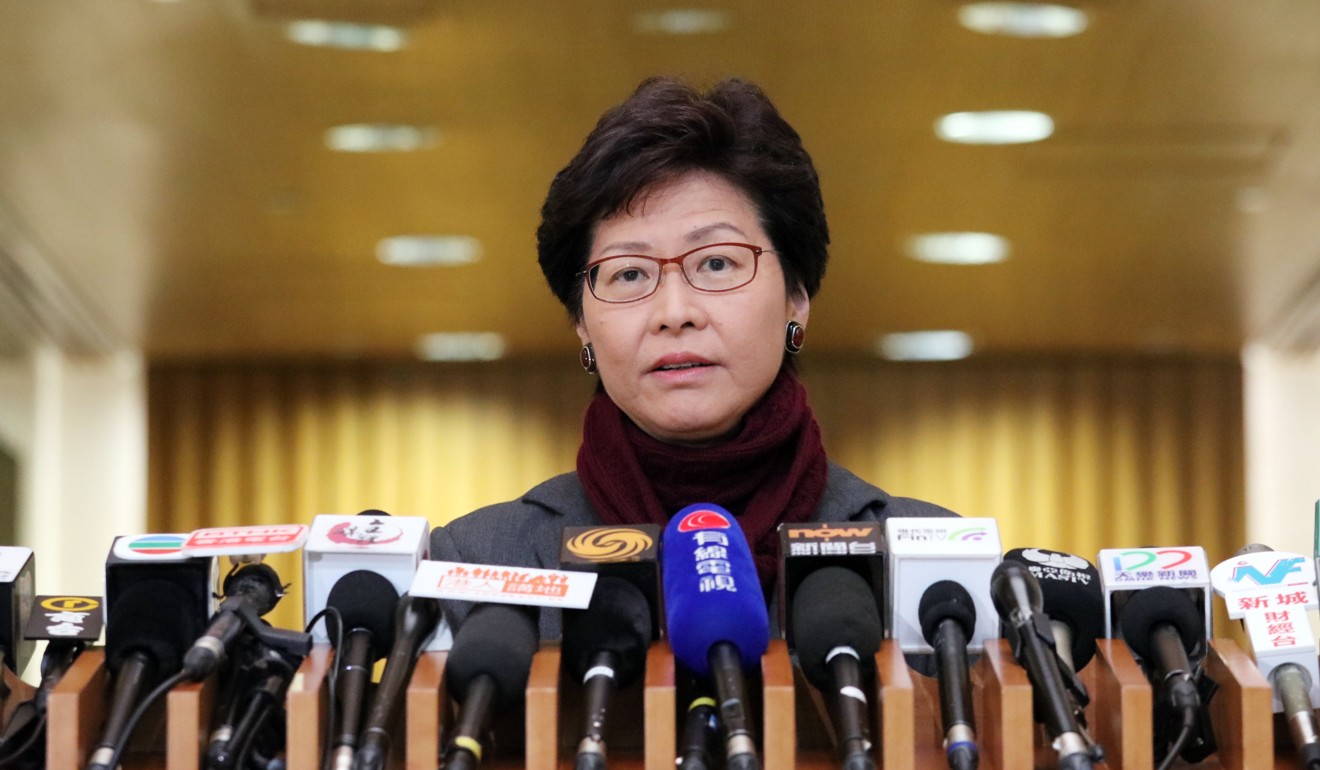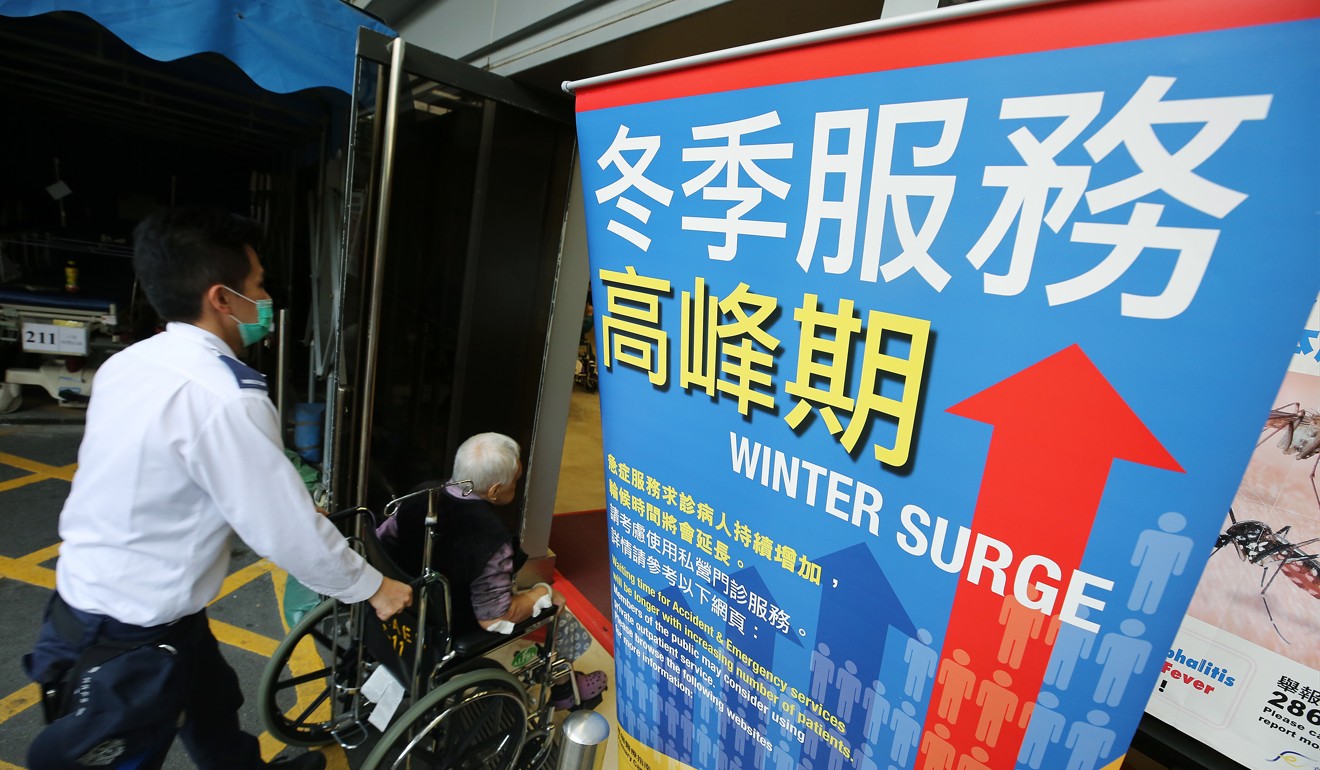
Swamped Hong Kong hospitals to get HK$500 million to handle winter flu emergency
Hospital Authority will also end wage freeze policy for new hires and recently promoted staff in unprecedented move
Hong Kong’s public hospitals are getting HK$500 million (US$64 million) in extra funding from the government as they struggle to cope with a deluge of winter flu cases amid a severe shortage of nursing staff.
“To provide the Hospital Authority management with every assurance in terms of resource support to implement short-term or immediate measures, I will allocate an additional HK$500 million,” Lam said.

The funds would later be reimbursed by the government in the financial year 2018/19.
Lam said her decision was prompted by a letter health sector lawmaker Joseph Lee Kok-long had sent on behalf of the Association of Hong Kong Nursing Staff, the city’s biggest nurses’ group.
The association ran a full-page newspaper advertisement last Thursday urging officials to put more resources into tackling the staff shortage at overburdened public hospitals.
Relief measures supported by the additional funding would include recruitment of new clerical staff to reduce nurses’ administrative burden; recruitment of part-time medical professionals; and suspension of hospital accreditation to enable the institutions to focus on treating patients.

The latest authority data showed that 5,838 individuals sought medical care in the accident and emergency units of public hospitals across the city on Monday, among whom 950 were transferred to medical wards. This drove the average bed occupancy rate up to 111 per cent, with the highest being 124 per cent at United Christian Hospital in Kwun Tong.
The high occupancy rate has been due to people coming down with flu.
As of last Saturday, the close of the third week of the flu season, the Centre for Health Protection said “the overall admission rate in public hospitals with principal diagnosis of flu was 1.14 (per 10,000 people)”. This figure was “above the seasonal threshold of 0.20 and higher than 0.60 recorded in the previous week”.
The Hospital Authority] should not tell people the situation is not that bad when they keep adding extra beds but not frontline staff
This year to date, a total of nine severe flu cases involving children were recorded as of Monday, according to the centre. They included two deaths.
And from the beginning of the winter flu season through Monday, 144 severe flu cases were reported for patients of all ages, including 77 deaths.
To boost morale and retain talent, Lam asked the authority to abolish its policy of freezing the pay of staff hired or promoted since 2002 for their first two years in a new position.
The chief executive said she had read the association’s letter last Saturday upon returning from a trip to Switzerland, and told the authority it “must implement this measure … and abolish the [policy], which seemed unfair”.
Lam noted it was introduced more than a decade ago because of financial difficulties the authority faced at the time, adding it was inconsistent with the general salary policy for civil servants.
“Removing this particular practice will be, in my view, a sort of recognition of the very dedicated staff that we now have in the Hospital Authority,” she said on Tuesday.
Lee, who also chairs the nurses’ group, said frontline staff had already reached a “breaking point”.
“One nurse is handling up to 11 to 12 patients at a time,” the lawmaker explained. “[The Hospital Authority] should not tell people the situation is not that bad when they keep adding extra beds but not frontline staff.”
How one school has led the fight to protect Hong Kong’s children from the flu season
Lee welcomed the new funding and suggested the government enhance its understanding of medical care reform costs by planning how the HK$500 million would be spent.
“It’s a good starting point for us to learn how much we have to spend on short-term relief measures and long-term reform, as well as what kinds of measures can be turned into permanent ones,” he said.
Aside from calling on the Hospital Authority to immediately scrap the wage freeze policy, the lawmaker said medical staff affected by the policy over the past 15 years should be compensated.
He also urged hospital bosses to raise the ex gratia subsidy for medical staff who worked overtime and to simplify application procedures to offer more incentives when the need for extra staff was greater.
The authority on Tuesday promised to engage the nurses to review the wage freeze policy. It said that, as of Sunday, it had hired 1,248 extra part-time staff to cope with the workload.
For 2018/19, the authority planned to hire 2,230 full-time nurses. It said that, at the end of last year, it had hired 1,842 full-time nurses out of its goal of 2,130 total for 2017/18, or 86 per cent.


